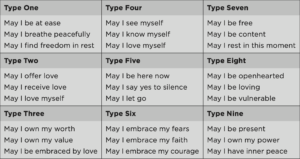 The Loving Kindness meditation is an unconditional, inclusive meditation practice that aids in the development of radical compassion for yourself and others. Called metta bhavana in the Buddhist tradition, this practice may be adapted or used as a tool for coming into greater awareness of your own belovedness. When practicing a Loving Kindness meditation, we dial down the voice of our inner critic, muting the self-criticism, and internal commentary. In this way, we open to “presence of being” with ourselves in a non-judging way, just as we are. Herein lies the portal to generating compassion. The practice of Loving Kindness progresses from generating compassion for ourselves, to those we love, and eventually for even those we may consider our enemy.
The Loving Kindness meditation is an unconditional, inclusive meditation practice that aids in the development of radical compassion for yourself and others. Called metta bhavana in the Buddhist tradition, this practice may be adapted or used as a tool for coming into greater awareness of your own belovedness. When practicing a Loving Kindness meditation, we dial down the voice of our inner critic, muting the self-criticism, and internal commentary. In this way, we open to “presence of being” with ourselves in a non-judging way, just as we are. Herein lies the portal to generating compassion. The practice of Loving Kindness progresses from generating compassion for ourselves, to those we love, and eventually for even those we may consider our enemy.
To develop your own practice is simple:
1. Choose a few affirming statements or phrases that attend to a tender part of your heart.
2. Determine those you intend to include in this practice, those who you hope will also benefit from your mindful loving kindness.
3. Assume a posture that is relaxed while remaining attentive and alert. If you’re able, sit upright in a comfortable chair or with your legs crossed on the ground. Close your eyes or allow your gaze to gently drift to the floor two to three feet in front of you. Draw attention to your breathing and allow it to return you to the present moment every time you get distracted.
4. Begin your practice by repeating your own affirming phrases for three or four minutes. (You may even want to give yourself more time at the outset of habitualizing this meditation.) After a few minutes, begin to affirm these statements for others, offering each successive movement an additional three or four minutes. Ideally you would spend fifteen to twenty minutes with this practice but, depending on your time constraints, you may be able to accomplish these stages in a briefer amount of time.
Successive Stages of the Practice
1. I practice for myself, including my inner child and my inner critic.
2. I practice for a person who has taught me about self-acceptance and compassion, usually a mentor or teacher (past or present).
3. I practice for a person whom I love and care for deeply (I imagine them sitting with me).
4. When I feel rooted in the loving kindness being generated, I try to practice for a person who is difficult for me, someone who has hurt or betrayed me.
5. I practice for my local community, for my extended community, and for those near and far who are suffering.
Enneagram Type Specific Mantras (from The Enneagram of Belonging)
Resources
The Enneagram of Belonging: A Compassionate Journey of Self-Acceptance by Christopher L. Heuertz
